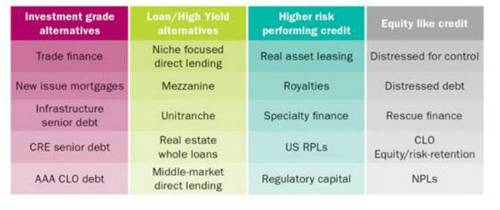Chris Redmond, global head of credit at Towers Watson, said: “Increased regulation and stress testing of the banking system has created a set of new asset classes which increasing numbers of institutional investors are taking advantage of to increase portfolio diversity and achieve higher returns. These new ‘good’ banks have a competitive advantage when providing capital in illiquid credit given their longer investment time horizon, tolerance for illiquidity and lower sensitivity to the credit cycle.”
According to the research, investors have historically used private equity, real estate, infrastructure and hedge funds to access alternative risk premia, including the illiquidity risk premium, to help diversify the sources of return. The company suggests investors with sufficient governance should consider including illiquid credit in their portfolios for a number of reasons:
-
Huge illiquid credit markets remain untapped despite the high and growing rate of bank retrenchment
-
There is a critical need for investors to diversify sources of credit risk at this point in the cycle
-
Provides access to often under- or poorly-utilised return sources: illiquidity, skill and complexity premia.
Chris Redmond said: “We believe there is significantly greater scope for investors to consider illiquid credit as a meaningful part of both low risk and return-seeking portfolios, indeed we view this an excellent opportunity for investors with a tolerance for illiquidity and a desire to improve overall portfolio efficiency.”
In the research investors are warned not to lose sight of cyclical headwinds associated with a mature credit cycle and compressed valuations in those markets segments already influenced by quantitative easing and investor search for yield. In addition, it suggests investment in illiquid credit presents a challenge of greater complexity and the associated governance and asserts that only through discipline, selectivity and skill can the benefits of illiquid credit be successfully exploited.
Chris Redmond said: “Governance permitting, we believe implementation should be focussed, specialised, dynamic, and built with a strong appreciation for the broader portfolio. Illiquid credit exposure should be developed and maintained via investments in a series of closed-end vehicles selected on their future risk-adjusted total return prospects at the time of deployment. Derived using a blend of top-down and bottom-up inputs, an assessment of where the illiquidity premium is most attractively priced should represent an important determinant.”
Towers Watson classifies illiquid credit (or private debt) as part of the broader alternative credit universe, specifically those non-traditional asset classes where there is limited ability to sell prior to maturity and includes Direct Lending, Distressed Debt and Specialty Finance.
The breadth of opportunities available within illiquid credit
Opportunities exist across the risk and return spectrum
|


